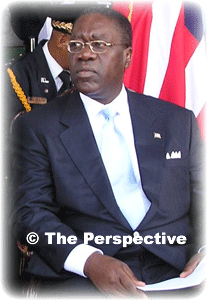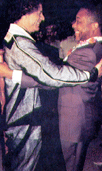
Libya And Liberia: Why Is Chairman Bryant Going To Tripoli?
By Abdoulaye W. Dukulé
Adukule@theperspective.org
The Perspective
Atlanta, Georgia
January 25, 2005
 |
 |
In 1979, when President William R. Tolbert hosted the Organization of African Unity (OAU) Summit, Libyan strongman Moammar Kaddafi flew into Monrovia with one of the largest delegations, equipped with armored cars and toilet seats. This was the hey-day of the Cold War. For years, President Tolbert had been trying to diversify his foreign policy options, courting “new friends.” The Liberian-Libyan Holding Corporation was the fruit of this newfound openness. The question for many was how Tolbert would keep his balance on the one hand between the United States, Liberia’s strongest and oldest ally, and on the other Libya, a growing U.S. nemesis and close friend of the USSR, which at the time lent support and money to everything anti-America. Just a few months after the OAU Summit, Tolbert was gunned down in a predawn military takeover led by Master-Sergeant Samuel K. Doe.
Once in power, Chairman Doe decided to play the “revolutionary” card. His first international visit took him to Ethiopia to break bread with Mengistu, the red dictator who had overthrown His Imperial Majesty Haile Selassie. Following the visit, a group of University of Liberia students went to Ethiopia to study “adult literacy.” After Addis Ababa, Samuel Doe planned to visit Libya and a date was set. However, playing to the logic of the Cold War, after his return from a triumphant visit to Ethiopia, Samuel Doe changed his orientation. Rather than go to Tripoli and sip revolutionary tea under a tent in the desert, he accepted an invitation to pay visit to the White House where president Ronald Reagan toasted him and showed him around as a great friend of America in Africa. In place of his military fatigues, Doe was now donning three-piece designer suits and an Afro. The “leftists” in his government were all “let go,” some exiled, others executed. Meanwhile, the Russian embassy in Monrovia became a dangerous place for any Liberian to visit. The “Liberian revolution” was over. William Swing, the new US ambassador to Liberia became the main policy maker and Liberia regained its rightful place in Washington’s African policy, becoming a transit point to ferry arms to Angola where Dr. Jonas Savimbi and his UNITA were fighting “communists”.
Fast forward to the mid-1980s: at an OAU conference in central Africa, a very angry Samuel Doe challenged Mr. Kaddafi to a fistfight in the street after Kaddafi accused him of being a “stooge” of the US and a “spy for imperialists” who should not be allowed in an African heads of state meeting. This open argument between the two men was only the tip of the iceberg that had developed between them. Kaddafi was bent on fighting what he called then “American imperialism” on the continent. He provided money, training and arms to anyone ready to take on what he perceived as a “neocolonial regime.” From Chad to South Africa and from Uganda to Dakar and to the Irish Republican Army, Libyan-sponsored guerillas fought everywhere, bombing airplanes and discothèques and killing thousands of innocent bystanders in the process.
 |
|
Kaddafi and Taylor
|
In the 1990s, in his quest for peace, Dr. Amos Sawyer, then president of the interim government, traveled to Libya to ask Mr. Kaddafi to put pressure on Taylor to accept the peace plan of ECOWAS. Kaddafi played the gracious host but would continue to provide every imaginable service to Taylor and his National Patriotic Front of Liberia (NPFL). The Libyan leader was bent on controlling the West African coastline and banked on Taylor to deliver it to him. He would stay as the major backer of the Taylor movement until the Monrovia regime proved incapable of delivering what it had promised. Taylor, a year or two prior to his downfall, had all but become persona-non-grata in Libya.
Either because Taylor failed to deliver Sierra Leone and Guinea into the Libyan fold, or because Kaddafi, pressured by sanctions following the Lockerbie air bombing, was trying to clean his image, or even as some suggest, he had found out that Taylor was an American agent – the Libyan leader broke the umbilical cord. Taylor was overthrown by a combination of rebel forces and international pressure. Libya is now slowly making its way back into the comity of nations after admitting to its role in the Lockerbie air bombing and accepting to pay some $3 billion to the victims of the Pan Am crash as well as undisclosed amounts for other terrorists actions in Europe – among others a UTA flight bombed in Africa and a discotheque bombed in Germany.
The re-entry of Libya into the international community was sanctioned by its recognition of its responsibility in terrorist activities and making reparations. When Taylor was president, he traveled often to Libya as “a beggar.” He went there to pay tribute to those who he thought allowed him to fulfill his ambitions. This is not and should not be how Liberia approaches Libya today.
More than any country in the world, including Burkina Faso and Cote d’Ivoire, Libya must be held primarily responsible for training, arming and sponsoring Charles Taylor and his army that have caused so much destruction in Liberia in terms of human lives and infrastructures. It was Libyan “policy” that caused the death of about 250,000 Liberians and the total destruction of the Liberian nation. Liberia should go after Libya just as the US went after the Taliban regime in Afghanistan after the September 11, 2001 terrorist attack.
Liberia does not have the military power to attack Libya nor does it have the political clout to drag Kaddafi in front of a war crimes tribunal for reparation and for war crimes committed against the people of Liberia and Sierra Leone. However, the last thing Liberia needs to do is to have its leader fly into Tripoli and receive pocket change while the adverse consequences of Libyan policies in Liberia will take generations to be corrected.
To put it mildly, Liberia should not accept from Libya anything short of a public recognition of its guilt in the destruction of Liberia, its acceptance to take full responsibility for the loss of life and property and its willingness to make reparations to the people of Liberia.
What Libya owes Liberia is not a few hundreds of thousands of dollars to meet government late night emergencies, but a real commitment to participate in the reconstruction of Liberia, starting with bringing in water and electricity and negotiating in the long-term reparation for lost lives.
Anything short of this on the part Gyude Bryant and his team visiting Libya this week, would be tantamount to agreeing that Libya was right in helping to destroy Liberia, devastating its meager infrastructures built by generations of struggling Liberians. It would also be tantamount to acquiescing to the fact that the lives of the more than 250,000 Liberians are not worth fighting for.
Gyude Bryant must bring back from Tripoli something more tangible than platitudes about “African unity” and empty rhetoric of collaboration. Liberians cannot indict Charles Taylor on the one hand and give accolade to Kaddafi on the other: they are the same. The only difference between the two men is that Kaddafi today may have the means to resolve some of the disastrous effects of his policies.
The demand for reparations from Libya must not be left in the hands of government alone. Liberians everywhere must raise their voices to bring Kaddafi to book. A few months after the end of the war in 2003, Libyan diplomats were seen distributing rice in Monrovia. Nice gesture but Liberian lives, and the billions of dollars of infrastructure destroyed by Libyan trained guerillas, are worth more than a few bags of rice.
As one who has lived in Liberia throughout the 14 years of madness, Chairman Bryant is certainly well aware of these facts, however, a reminder can’t hurt.
